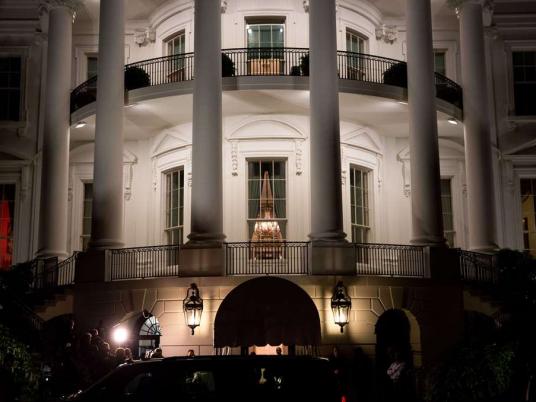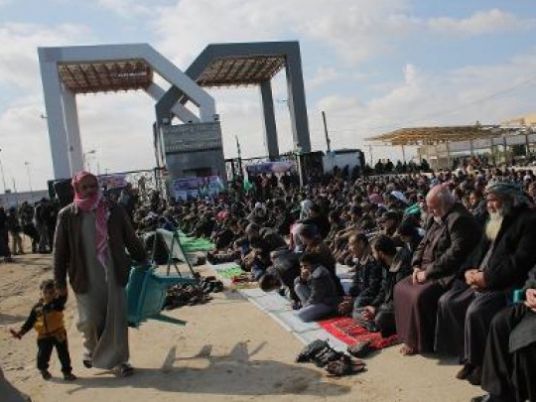
US President Barack Obama arrives in Israel on Wednesday without any new peace initiative to offer disillusioned Palestinians and facing deep Israeli doubts over his pledge to prevent a nuclear-armed Iran.
Making his first official visit here as president, Obama hopes to reset his often fraught relations with both the Israelis and Palestinians in a carefully choreographed three-day stay that is high on symbolism but low on expectations.
He will meet Israeli Prime Minister Benjamin Netanyahu, hold separate talks in the occupied West Bank with Palestinian President Mahmoud Abbas and address a skeptical Israeli public with a speech to students.
US officials say he will try to coax the Palestinians and Israelis back to peace talks. He will also seek to reassure Netanyahu he is committed to preventing Iran from getting a nuclear bomb and discuss ways of containing Syria's civil war.
However, the White House has deliberately minimized hopes of any major breakthroughs, a reversal from Obama's first four years in office when aides said he would only visit the Jewish state if he had something concrete to accomplish.
Workers have hung hundreds of US and Israel flags on lamp posts across Jerusalem, as well as banners that boast of "an unbreakable alliance," but the apparent lack of any substantial policy push has bemused many diplomats and analysts.
"This seems to me to be an ill-scheduled and ill-conceived visit," said Gidi Grinstein, president of the Reut Institute, a Tel Aviv-based think tank.
"On the Iranian situation, Israel and the USA don't seem to have anything new to say to each other. On Syria, the Americans don't have a clear outlook, and on the Palestinian issue, they are taking a step back and their hands off."
New Beginnings
With both Obama and Netanyahu just starting new terms and mindful that they will have to work together on volatile issues for years to come, they will be looking to avoid the kind of public confrontation that has marked past encounters.
Signaling the emphasis being placed on symbolic gestures, the US president plans to inspect an Iron Dome anti-missile battery when his plane lands at around 12:30 p.m. (1030 GMT).
He departed the Washington area on Tuesday evening.
The White House has touted the US-funded system, which has helped protect Israelis from Hamas rocket attacks from Gaza, as a prime example of Obama's commitment to Israel's security – a message likely to be rammed home during the trip.
A few hours before Obama was due to land in Israel, Netanyahu received an invitation from Russian President Vladimir Putin to visit Moscow, an Israeli official said, although he did not specify a date for the visit. That trip would follow a visit to Moscow last week by Abbas.
Obama, accompanied by his new secretary of state, John Kerry, will hold lengthy talks with Netanyahu later on Wednesday, with Iran expected to top the agenda.
Israel and the United States agree that Iran should never get a nuclear bomb, dismissing Tehran's assertion that its atomic program is peaceful. However, the two allies are at odds over how fast the clock is ticking down on the need for preventative military action should diplomacy fail.
US officials say Obama will urge further patience, with Washington worried that a threatened Israeli unilateral strike might drag the United States into another Middle East war.
Obama, who has said he is coming to listen, will fly on Thursday by helicopter the short distance between Jerusalem and the West Bank city of Ramallah to meet Abbas.
Direct negotiations between Israel and the Palestinians broke down in 2010 over the issue of Jewish settlement building in the West Bank, and Abbas's allies have expressed bitter disappointment over the lack of fresh US moves.
"It's not a positive visit," said Wasel Abu Yousef, a senior official in the Palestine Liberation Organization, led by Abbas.
In Ramallah on Tuesday, Palestinian police scuffled with scores of demonstrators protesting against Obama's visit.
Although Netanyahu repeated this week that he was ready to make "a historic compromise" to achieve peace, his new cabinet has several pro-settler ministers fervently opposed to halting building on land Palestinians want to establish their state.
Dennis Ross, Obama's former Middle East adviser, said the president was right to tread cautiously when peace prospects were dim and Israelis are more focused on what they see as greater threats presented by Iran and the war in neighboring Syria.
"What you don't want to do at a time when there's enormous disbelief on the part of both parties is to do something that will fail," Ross said.




